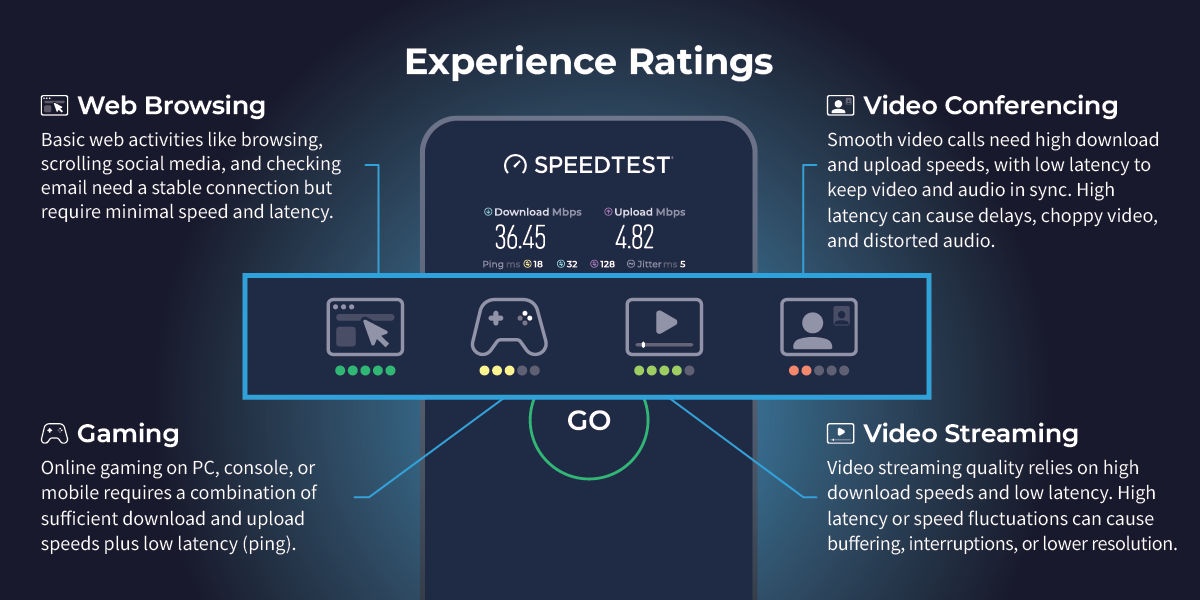We are excited to introduce Speedtest Experience Ratings, a new beta feature in the Speedtest app and website designed to help you better understand how your Speedtest results translate into real-world performance. These ratings provide insights on four key online activities: Web Browsing, Online Gaming, Video Streaming, and Video Conferencing. Each metric is given a score on a 1 to 5 scale (1 = Poor, 5 = Excellent) to indicate expected performance.

Metrics Impacting Your Ratings
While Speedtest primarily displays download speed, upload speed, and ping, our Experience Ratings account for additional factors like jitter, loaded latency, and packet loss. All of these metrics can impact real-world performance, even if your speed results look strong.
- Download Speed: How quickly you can pull data from a server on the internet to your device
- Upload Speed: How quickly you can send data from your device to the internet
- Latency (or Ping): The reaction time of your connection — how quickly your device gets a response after you’ve sent out a request
- Jitter: Also called Packet Delay Variation (PDV), jitter is a measure of the variability in ping over time
- Loaded Latency Increase: Calculates the excess latency by finding the higher value between download and upload latency and subtracting a baseline latency
- Packet Loss: Packet loss occurs when a packet of data being sent over the internet is not received or is incomplete
Understanding Experience Ratings
Web Browsing
Web browsing includes activities like visiting websites, scrolling social media, and checking emails. This is one of the least demanding activities in terms of speed and latency, but stability is key.
- Relevant Metrics: Download speed, Ping, Packet Loss, Jitter, and Loaded Latency Increase
- Recommended Speeds:
- Download: At least 1-5 Mbps
- Latency Considerations: Latency is not typically an issue for basic browsing
- Estimated Data Usage:
- General browsing & social media: ~60 MB per hour
- Email (without large attachments): ~1 MB per email
- Email (with attachments): Varies based on file size

Online Gaming
A smooth gaming experience requires a combination of sufficient download and upload speeds as well as low latency. High latency can cause lag, delays in player actions, and an overall poor experience.
- Relevant Metrics: Ping, Packet Loss, and Loaded Latency Increase
- Recommended Speeds:
- Download: 3-10 Mbps per player (higher for modern, high-resolution games)
- Upload: 1-3 Mbps
- Latency Considerations:
- Ideal Ping: Below 50ms
- Moderate Ping: 50-100ms (may experience minor lag)
- High Ping: Over 100ms (noticeable lag and delay in gameplay)
- Estimated Data Usage:
- Casual gaming: ~40 MB per hour
- Competitive online gaming: ~100 MB per hour
- Game downloads/updates: Varies significantly (e.g., AAA games can be 50-150 GB)

Video Streaming
The quality of your video streaming experience depends primarily on high download speeds and low latency. If latency is too high or speeds fluctuate, you may experience buffering, interruptions, or a reduction in video resolution.
- Relevant Metrics: Download, Ping, Packet Loss, and Loaded Latency Increase
- Recommended Speed:
- Standard Definition (SD, 480p): 3-4 Mbps
- High Definition (HD, 720p-1080p): 5-10 Mbps
- 4K Ultra HD: 25 Mbps or higher
- Latency Considerations:
- Low latency helps ensure smooth playback without buffering.
- Estimated Data Usage:
- SD (480p): ~700 MB per hour
- HD (1080p): ~1.5-3 GB per hour
- 4K UHD: ~7-10 GB per hour

Video Conferencing
For smooth video calls, both high download and upload speeds are important. Low latency is crucial for keeping video and audio in sync, whereas excessive latency can lead to delays, choppy video, and distorted or out-of-sync audio.
- Relevant Metrics: Ping, Packet Loss, Jitter, and Loaded Latency Increase
- Recommended Speeds:
- Standard Definition (480p): 1 Mbps download / 1 Mbps upload
- High Definition (720p-1080p): 3-6 Mbps download / 2-3 Mbps upload
- 4K Video Conferencing: 10-15 Mbps download / 5-10 Mbps upload
- Latency Considerations:
- Low latency helps ensure smooth playback without buffering.
- Estimated Data Usage:
- SD (480p): ~700 MB per hour
- HD (1080p): ~1.5-3 GB per hour
- 4K UHD: ~7-10 GB per hour

Speedtest Experience Ratings in Action
Here’s a look at Experience Ratings during a Speedtest:
Want to know your Experience Ratings? Take a Speedtest!
Ookla retains ownership of this article including all of the intellectual property rights, data, content graphs and analysis. This article may not be quoted, reproduced, distributed or published for any commercial purpose without prior consent. Members of the press and others using the findings in this article for non-commercial purposes are welcome to publicly share and link to report information with attribution to Ookla.

